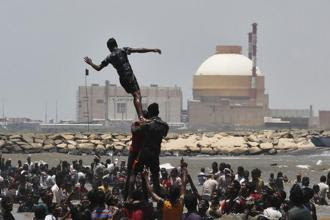The Intelligence Bureau report accusing Greenpeace India of wrongdoing nails nothing but the agency’s obtuseness

A file photo of protests against the Kudankulam nuclear power plant. The former prime minister, his office, and intelligence officials had accused overseas NGOs of fuelling protests against the project. Photo: Reuters
The silly season is here.
Perhaps nothing proves it more emphatically than the flap these past two days over a report of the Intelligence Bureau (IB) accusing environment watchdog Greenpeace India of wrongdoing.
Alleged wrongdoing ranges from Greenpeace India receiving foreign funds to commissioning studies that exposed deficiencies in health and diversion of water from Vidarbha, a water-scarce region.
More ominously, the IB report, widely publicized in media, accuses non-governmental organizations (NGOs) of stalling major projects. This, the report submitted to the Prime Minister’s Office allegedly asserts, will hold back economic growth by 2-3% a year. A major television channel went as far as to state that IB had “nailed” Greenpeace.
If the report indeed exists, IB has nailed nothing except its own obtuseness. Moreover, publicity around the report has served to do exactly the opposite of what IB may have had in mind. It has turned the spotlight on India not only as a prospect for pro-business policy and industry, but also a centre for human rights violations that often accompany such policy and industry.
Greenpeace International is based in the Netherlands, and has offices in the US, the UK, Russia, and dozens of countries across Asia, Europe, the Americas and Africa. As in these countries, the Indian arm of Greenpeace too receives foreign donations. Greenpeace India’s website (www.greenpeace.org/india/en/) has the following, typically blunt, pitch: “Financial support from you helps Greenpeace stay independent of government or corporate influence. This helps the organization take on strong corporate entities, government bodies and anyone who messes with the planet.”
The organization has its critics primarily on account of what some say is a dogmatic approach to environmental campaigning, and showboating worthy of Virgin Group chairman Richard Branson. But Greenpeace is unparalleled in the way it has drawn attention to renewable energy over fossil fuels, climate change, and hazards of chemical fertilizers and genetically modified crops.
Among other issues, in India, Greenpeace has taken its stand to the Singrauli district of Madhya Pradesh, where it is backing local inhabitants in their battle to resist being displaced by a coal mining joint venture of Essar Power and Hindalco Industries Ltd.
As with global colleagues like Amnesty International and Human Rights Watch, which have actively begun to oversee areas of business, industry and governance in India, that Greenpeace will encounter the dexterous hands of corporate influence and government is axiomatic. India routinely records massive violations of human rights, including in areas related to land acquisition, resettlement and rehabilitation.
Typically, such intervention adopts alarmist positions about the activities of NGOs—ironically, as alarmist as NGOs are accused of being. The former prime minister, his office, and intelligence officials from Tamil Nadu accused overseas NGOs of fuelling protests against the Kudankulam nuclear power plant. Foreigners were deported and hundreds were accused of “waging war” against the state.
Some of the funds were found to have been sent by overseas Indians to purchase local property. The foreigners turned out to be one German and three Japanese anti-nuclear activists. And the enemies of the state are local fisherfolk and farmers: men and women, old and young.
The danger is not only IB’s occasional mendacity—which dilutes the fine work the agency does in the areas of counter-terrorism and counter-insurgency. There is inherent danger in gratuitously cloaking dissent and protest in the harsh language of government. Such assertions—and these have routinely been used by several state governments to cancel the licence of NGOs to silence dissent—can pave the way for economic growth blind to all caution, all rights, all governance.
In 2009, lobby group Federation of Indian Chambers of Commerce and Industry (Ficci) published a Task Force Report on National Security and Terrorism. The task force comprised members drawn from the sphere of security affairs. Newly appointed national security adviser Ajit Kumar Doval, a former director of IB, topped the list.
I shall be discussing the report—and similar reports—in future columns. I would, meanwhile, share an observation. The Ficci report highlighted a “sense of desperation and alienation that is sweeping over large sections of India who have been marginalized, exploited and dispossessed”, especially in tribal homelands.
It is this marginalization, exploitation and dispossession that bona fide and dedicated NGOs and activists attempt to address, and aid in the cure—ultimately of the governance ills that plague India, make it weak. Maybe those tasked with intelligence need to consider that they are all on the same side. Even Greenpeace.
Sudeep Chakravarti’s forthcoming book is Clear-Hold-Build: Hard Lessons of Business and Human Rights in India.
rEAD mor ehere- http://www.livemint.com/Opinion/PGs0AaVdEHlI44Us44be2L/The-danger-with-choking-dissent.html
Leave a Reply